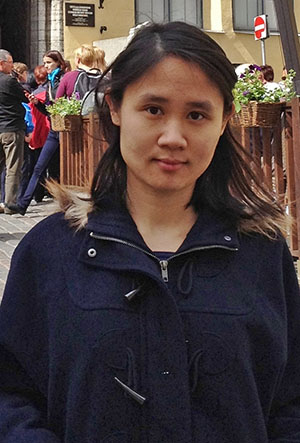Congratulations on your graduation doctor Sha Tao
Congratulations on your graduation
Sha Tao from Beijing, China came to KTH for master studies in System-On-Chip design and graduated in 2009. Thereafter she was enrolled as a doctoral student and now she has defended her PhD thesis "Power-Efficient Continuous-Time Incremental Sigma-Delta Analog-to-Digital Converters".

Where are you from and where did you study before coming to KTH?
– I am from Beijing, China. I received my Bachelor degree in Electronic Engineering from Beijing Jiaotong University. In 2007, I came to Kista for my Master studies on System-on-Chip design and graduated in 2009. Thereafter, I started my doctoral studies at KTH at the department of Integrated Devices and Circuits at School of Information and Communication Technology
What is your topic and why did you choose it?
– Our research project aims at investigating energy-efficient integrated solutions for biosensors. In particular, the focus of my PhD work is to explore novel design techniques at both the system and circuit levels by proposing power-efficient analog-to-digital converter architectures and integrated circuits. I chose this topic because research innovation in analog integrated circuits is fascinating - it is an art as well as a philosophy, which entails the perfect mixture of analytical skill, design compromise, inspiration and creativity.
Describe your topic in short.
– The objective of my PhD topic is to advance the field of analog-to-digital converters used for integrated bio-sensing systems. Since biosensors usually are powered by portable batteries or harvested energy, ultra-low power operation is of vital importance. Therefore, my research focus is to improve the power efficiency of analog-to-digital converters that meet the speed and resolution requirements of specific biosensor applications.
Tell me something about your results.
– We proposed and realized several power-efficient analog-to-digital converter integrated circuits. Experimental results reveal that the prototype analog-to-digital converters advance the state-of-the-art in terms of the power efficiency figure-of-merit and manifest advantages to be used in low-power high-resolution integrated biosensors.
What will the future bring for your research topic?
– In the near future, the research innovation in the integrated bio-sensing systems would potentially revolutionize the health care services, improve our quality-of-life, and contribute to a sustainable society.
What are your future plans?
– After receiving more than ten years of professional training in the academia, now it’s time for me to take a step further. For my future career, I would prefer devoting myself to the industry where I can contribute with my knowledge and creativity in developing consumer electronics that would add color to our everyday lives.

